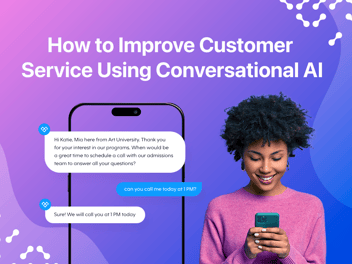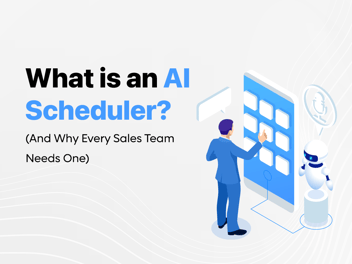How Can Conversational AI Help Sales Teams?

Every minute counts in business. Sales teams constantly juggle multiple tasks, from prospecting and nurturing leads to closing deals. But with the power of generative AI for sales, you can save your sales team up to two hours and 15 minutes a day.
How does it do that? By taking care of the mundane work that eats up valuable time. Here's the real beauty of AI in sales – it doesn't just automate away the monotony. Conversational AI, for instance, has been redefining customer interactions and paving the way for the future of marketing.
Let's explore the power of AI for sales and the many possibilities it can offer. From content generation to data analysis and task automation, AI is a versatile tool that can supercharge your sales efforts.
But, of course, no innovation comes without its challenges. We'll also tackle the hurdles and offer practical insights to ensure the smooth implementation of AI sales tools into your business operations.
Benefits of Using Generative AI in Sales
AI sales assistants have emerged as a game changer for sales professionals, providing numerous benefits that generative AI, alongside conversational AI, brings to the sales domain. Here are some key benefits you should know about.
Improved Customer Experiences
Generative AI is a powerful tool for enhancing customer experiences in sales. By harnessing its capabilities, sales professionals can tap into personalized insights to better understand their customers. This leads to a more informed and effective sales force capable of tailoring their approach to meet individual needs.
However, it's crucial to acknowledge generative AI's limitations in truly comprehending customers' context and motivations. While it can provide valuable insights, human sellers remain indispensable in interpreting and converting these generated insights into meaningful interactions.
Conversational AI for sales also plays a pivotal role here. It enables businesses to engage with customers in a natural, engaging manner, providing instant support and information.
It also analyzes interactions, offering constructive suggestions to sales teams. This, in turn, enables organizations to optimize their sales potential continuously.
While some still view AI skeptically, there is a clear indication of interest among 52% of consumers who are open to AI assistance in navigating a product or service. Plus, using sales AI equips teams with the means to customize customer interactions, guaranteeing that each interaction is pertinent and leaves a significant impression.
Increased Efficiency for Sales Professionals
Generative AI for sales excels in increasing efficiency for sales professionals by automating time-consuming tasks, streamlining workflows, and providing real-time coaching. During live presentations, AI can provide prompts and recommendations, boosting the chances of a successful pitch.
But the efficiency gains don't stop there. AI-driven sales training modules refine skills and enhance the performance of sales representatives, ensuring they are well-prepared for any situation. This continuous learning process saves time and contributes to better results.
Elevating Sales Rep Performance
Conversational AI for sales, often functioning as a lead magnet, assists in the lead-scoring process by evaluating prospects' intent and affinity for a product or service.
You can use a leading AI texting platform such as Meera, which employs a sales bot powered by conversational AI. Meera simplifies prospect navigation, provides them with real-time assistance, and engages with leads immediately to reduce friction points and shorten sales cycles, seamlessly guiding them through the sales funnel - while still maintaining a human touch.
An AI sales assistant can analyze historical data, recommending relevant action steps to enhance the person-to-person work of sales professionals. This data-driven approach not only saves time but also helps sales reps make informed decisions that lead to higher conversion rates.
Furthermore, AI-generated sales forecasts and sales analytics offer critical insights into market trends and customer behavior. Armed with this information, organizations can optimize decision-making and improve sales outcomes.
The concept of prescriptive analytics becomes pivotal here, guiding sales teams with real-time analytics, sentiment analysis, pipeline analysis, and sales rep performance analysis.
Streamlining the Sales Process
Imagine having a virtual assistant that generates sales materials and improves sales presentations in real-time. It does this by providing tailored recommendations and prompts based on the specific needs and preferences of the prospect. This level of customization ensures that each interaction is more impactful and relevant.
Generative AI for sales takes the burden of administrative tasks off the shoulders of sales teams, allowing them to devote their time and energy to strategic activities that drive revenue and growth.
Enhancing Customer Interactions and Service
AI for sales improves customer interactions by harnessing the insights gathered by human sellers and converting them into actionable steps. It's true that language models powered by AI can generate well-thought-out answers to complex queries, but they still lack the nuanced understanding of the context that human sellers possess.
Here, the role of AI is clear – it serves as a tool to support human sellers in delivering personalized experiences to customers while addressing their pain points. By analyzing data and patterns, AI can help identify customer preferences and anticipate their needs, allowing sales professionals to provide solutions that truly resonate.
Allocating More Time to Customers
Consider the time-consuming chores like prospect research, drafting cold emails, updating CRM systems, and scheduling meetings. Generative AI can easily tackle these, freeing sales professionals to invest their time in activities directly impacting revenue generation.
Reducing administrative time can significantly boost the productivity of sales reps. In fact, a reduction in administrative tasks allows reps to make an additional two to three calls per day. When they have more time to engage with leads and customers, they can meet quotas more effectively and generate more revenue for the organization.
Examples of Generative AI Tools for Sales
Generative AI tools are transforming the way sales professionals operate in the sales landscape. Here are examples of how AI revolutionizes the sales process, saves time, reduces errors, and enhances customer interactions.
Additionally, we'll highlight the role of conversational AI in complementing generative AI's capabilities.
Automated Prospecting Emails & Texts
One of the fundamental tasks in sales is reaching out to potential leads and prospects. It's a process that demands time, precision, and a knack for crafting compelling messages.
Generative AI tools, including AI texting through conversational AI, come to the rescue by automating the creation of prospecting emails and texts, revolutionizing this critical phase of the sales journey.
These tools can also take inputs from Customer Relationship Management (CRM) systems or research tools, utilizing the data to generate highly personalized emails and texts. Think of the efficiency of having a tool that pulls information from your CRM and also specializes in crafting engaging first lines for cold emails, grabbing the recipient's attention from the get-go.
Imagine being a skilled sales professional working in the software solutions industry. You're tasked with reaching out to potential clients who have shown interest in your business' products through various channels.
In the past, you may have spent hours crafting prospecting emails manually, a time-consuming process that occasionally led to errors and inconsistencies. But today, you've transformed her approach thanks to the power of conversational AI.
Using automated emails and texts can help you accomplish the following:
- Data Integration: The AI system seamlessly connects with CRM and other data sources, gathering in-depth prospect information.
- Personalized Content: Utilizing this data, the AI crafts highly personalized emails and texts, highlighting features relevant to each prospect's interests.
- Engaging First Lines: The AI specializes in creating compelling first lines for cold emails, instantly capturing the prospect's attention.
- Multichannel Outreach: Sarah can choose email or text based on the prospect's preference, with AI ensuring consistent messaging.
- Scheduling and Follow-up: Conversational AI for sales schedules messages at optimal times, accounting for time zones and historical response patterns, and automates follow-ups.
With these AI for sales, the future is promising and more productive than ever.
Language Models & Content Generation Tools
Conversational AI tools offer a wide range of applications, from drafting personalized emails to creating persuasive sales proposal slides and even improving the capabilities of AI sales bots.
In this case, imagine being a dedicated sales representative in a rapidly growing tech company. Your role involves engaging with potential clients and nurturing leads through a series of interactions.
In a competitive market, personalization and effective communication are vital. Crafting tailored emails, designing persuasive sales proposals, and maintaining engaging conversations with prospects requires time and effort.
To your benefit, you can rely on AI sales tools to streamline your sales efforts and make a lasting impression. You can integrate language models and content generation tools into your system in the following ways:
- Personalized Email Drafting: Language models can analyze prospect data and create highly personalized email templates that resonate with the recipient. This level of personalization goes beyond simple mail merge and addresses specific pain points and interests.
- Sales Proposal Slide Creation: Content generation tools can automate the creation of visually appealing and content-rich sales proposal slides. They can extract key data points from CRM systems and incorporate them seamlessly into presentation materials.
- Enhancing Sales Chatbots: Conversational AI for sales can be employed to improve the conversational abilities of chatbots. By leveraging vast language datasets, an AI sales bot can engage in more natural, context-aware conversations with potential customers, providing instant support and information.
Generative AI tools, when harnessed effectively, can be the driving force behind sales teams' success. However, it's essential to acknowledge the challenges of their implementation.
Prompt engineering, which involves providing clear instructions to the AI, is crucial to obtaining the desired output. Content filtering is equally important to ensure that the generated content aligns with brand values and complies with industry regulations.
Challenge of Implementing Generative AI in Sales Teams
As the adoption of generative AI in sales teams gains momentum, it's crucial to acknowledge that with innovation come challenges. These hurdles, though surmountable, require careful consideration and strategic solutions.
Training & Adoption Issues
Implementing generative AI for sales encounters resistance due to the need for proper training and adoption. Sales professionals may be accustomed to traditional methods and apprehensive about embracing AI-driven solutions.
When implementing generative AI, sales teams might face the following training and adoption issues:
- Resistance to Change: Teams may resist adopting AI-driven tools because they rely on traditional methods. They might be comfortable with their existing processes and feel apprehensive about incorporating AI into their daily routines.
- Training Gaps: Inadequate training and guidance on using generative AI tools can leave sales teams feeling unprepared and frustrated. Without proper instruction, they may struggle to maximize the potential of AI tools.
- Integration Challenges: Integrating generative AI tools into existing sales processes and software can be complex. Compatibility issues, data migration, and technical glitches can hinder smooth adoption.
Organizations can leverage the power of sales AI itself to address these challenges. Here's how:
Customized Training Materials
An AI sales assistant can create tailored training materials and simulations. These resources address the unique challenges and requirements of each sales team.
For example, suppose a sales team primarily deals with complex technical products. In that case, AI can generate content for training modules focusing on technical specifications and customer pain points specific to those products.
AI-Driven Sales Training
By incorporating generative AI into the training process, sales professionals can access on-demand training modules that enhance their skills, product knowledge, and ability to address customer objections.
These modules can be customized to adapt to individual learning styles and paces, ensuring effective learning.
Assistance from Conversational AI
Conversational AI can play a crucial role in easing the training and adoption process. It can act as a virtual tutor, providing instant support and clarifications to sales professionals as they navigate the new AI-powered tools.
For example, if a salesperson encounters difficulties using a generative AI-based content generation tool, they can ask the AI assistant for guidance, receiving real-time assistance.
With these, the challenge of training and adoption can be effectively addressed through the very technology being implemented, ensuring a smoother transition for sales teams into the world of generative AI.
Final Thoughts: Conversational AI is Essential
With customer-centricity and operational efficiency leading sales, conversational AI emerges as an unsung hero. While generative AI for sales drives operational efficiency and content generation, conversational AI plays an equally pivotal role in shaping the future of sales.
Conversational AI is the silent partner that orchestrates seamless customer interactions, enhances support through intelligent chatbots, automates inventory management with precision, fine-tunes pricing strategies for optimal profitability, and spearheads targeted marketing campaigns that hit the bullseye.
As sales professionals embrace the possibilities of conversational AI, they find themselves armed with tools that not only streamline their operations but also deliver personalized recommendations, provide instant support, and open new horizons for growth.
The synergy between generative AI and conversational AI for sales is a driving force, propelling sales teams into a future where efficiency and customer satisfaction walk hand in hand.
A programmer by trade, Nick Saraev is a freelance writer and entrepreneur with a penchant for helping people achieve their business goals. He's been featured on Popular Mechanics & and Apple News and has founded several successful companies in e-commerce, marketing, and artificial intelligence. When he's not working on his latest project, you can find him hiking or painting.


.png?width=512&height=512&name=guru%20(1).png)

.png?width=199&height=109&name=salesforce-logo1-removebg-preview%20(1).png)


.webp?width=716&height=569&name=banner-img%20(1).webp)


.png?width=352&name=reduce%20cost%20(1).png)
